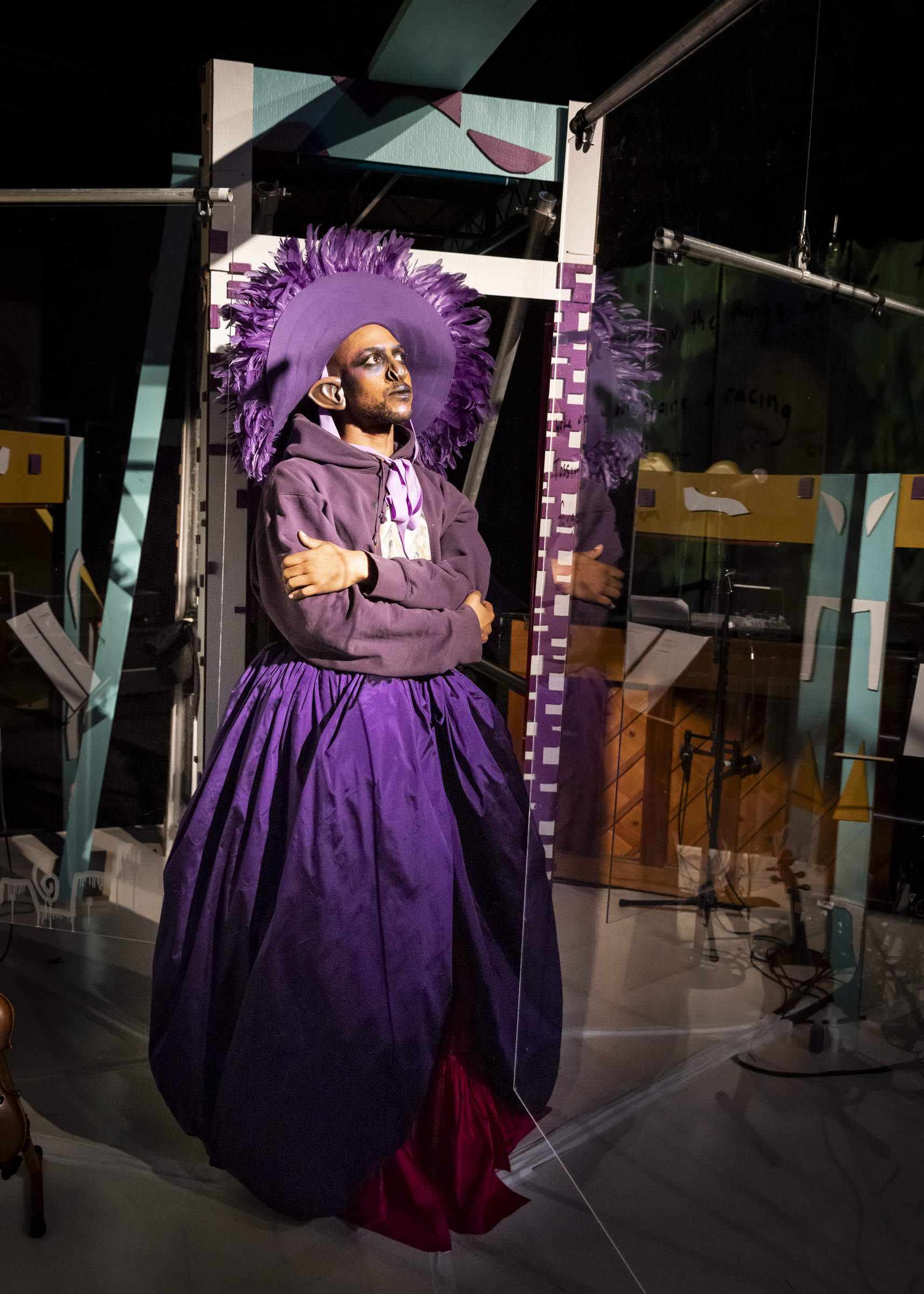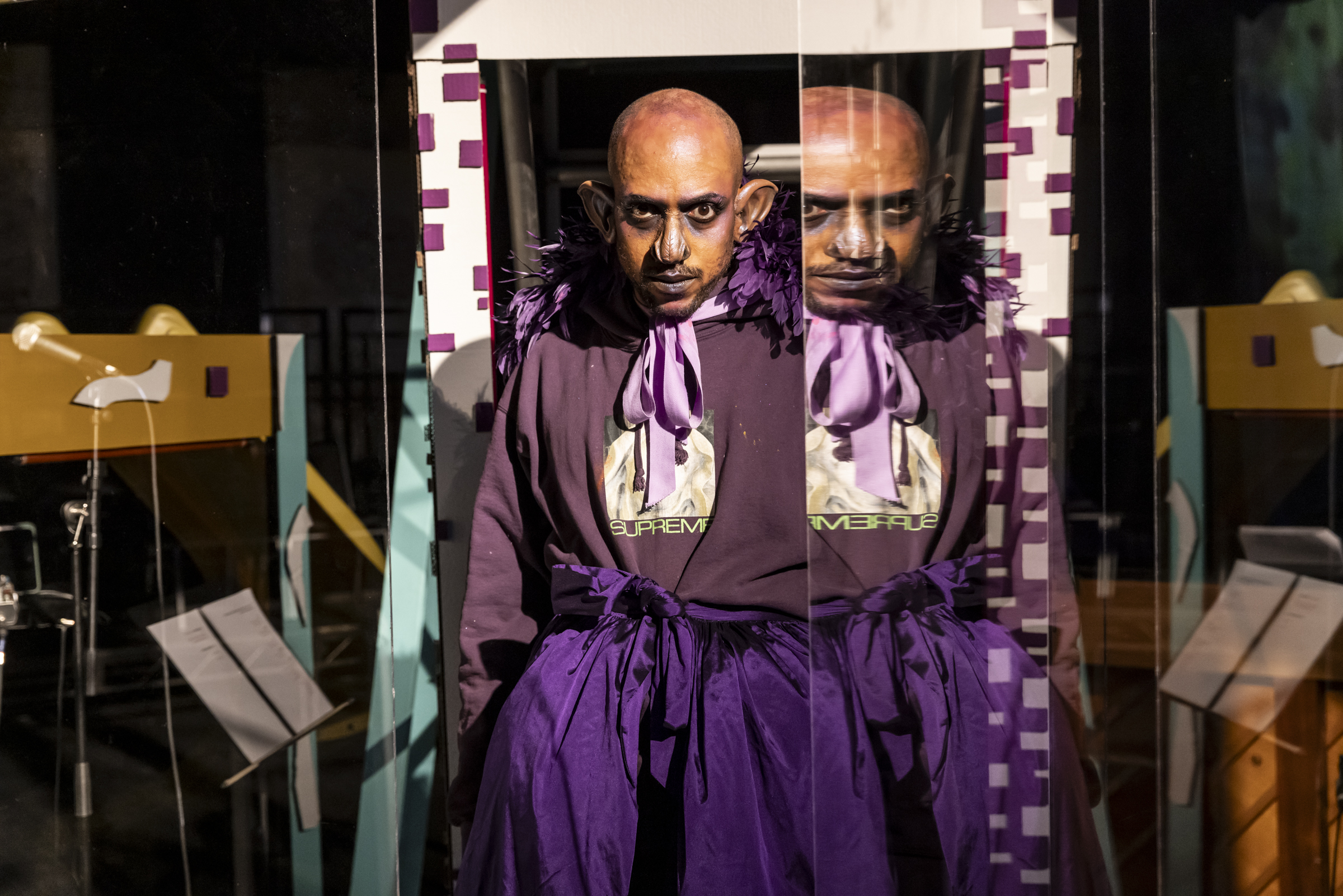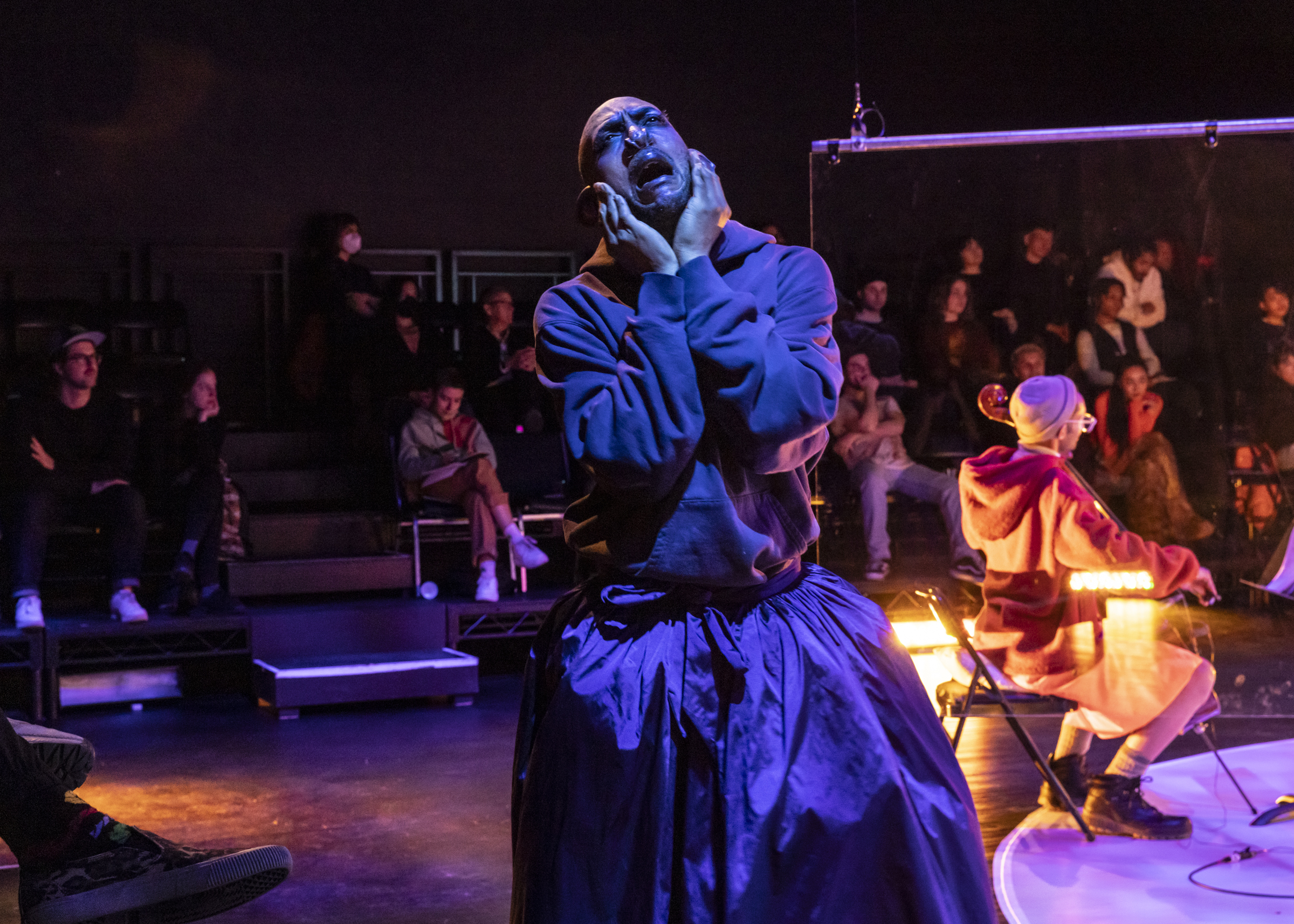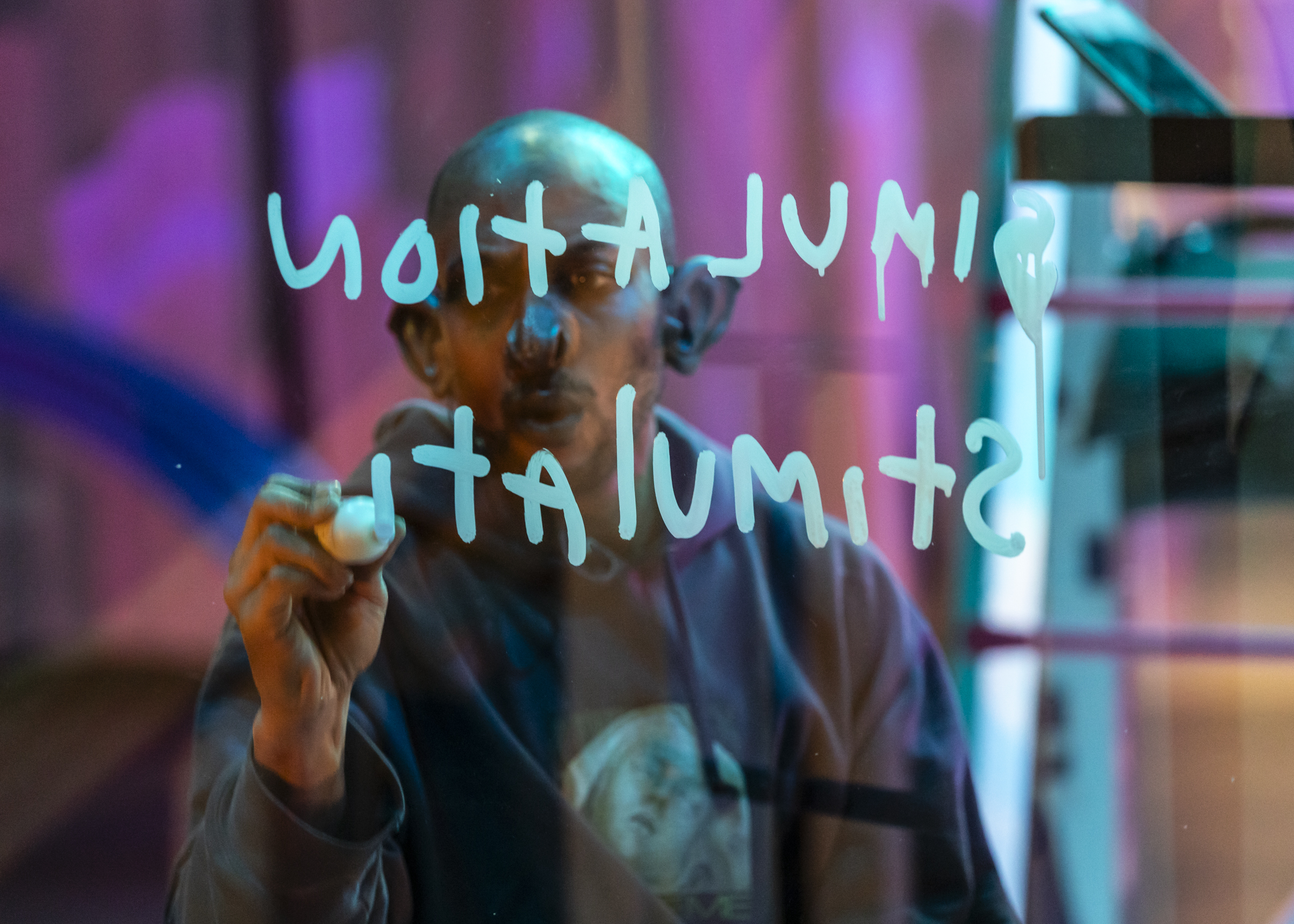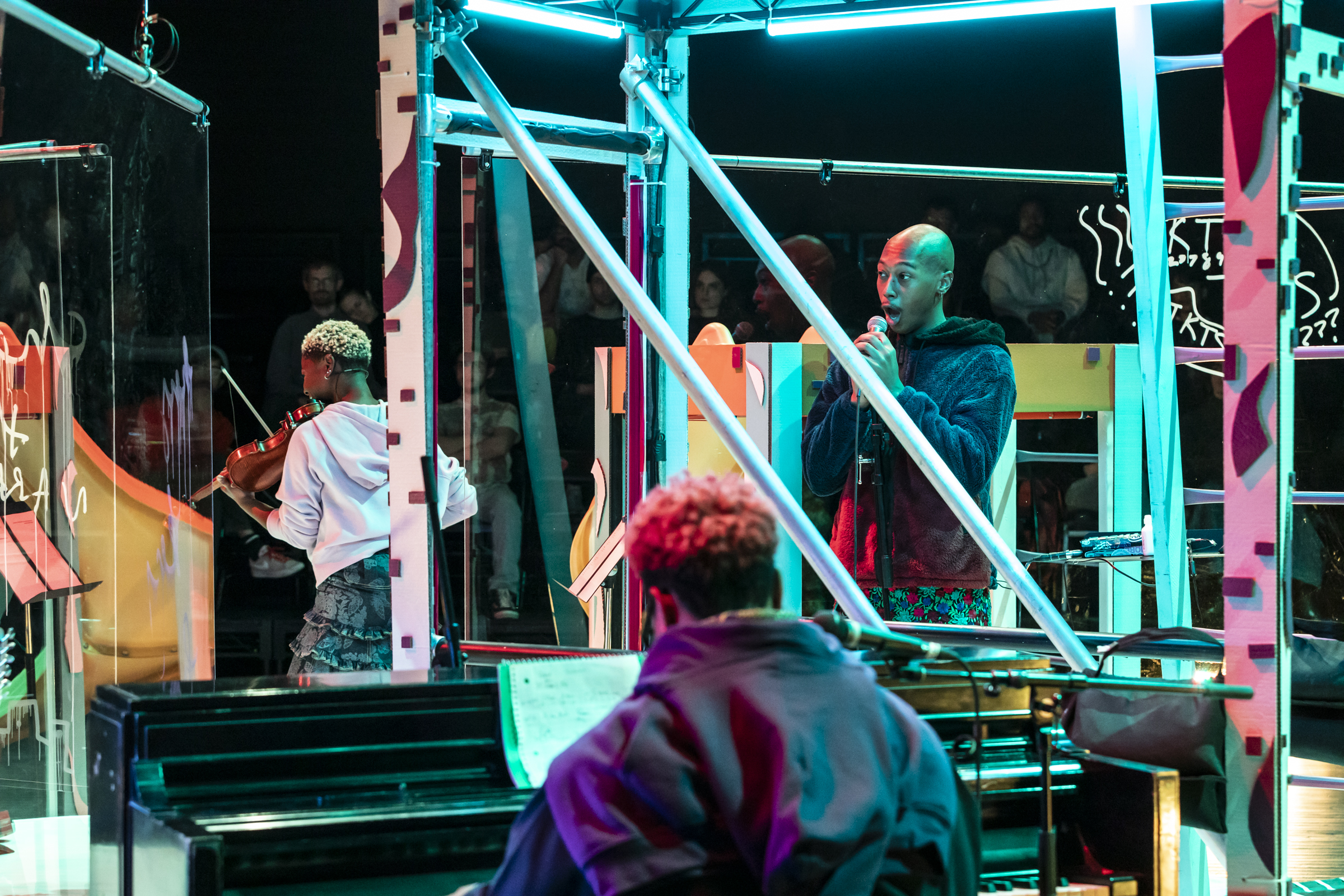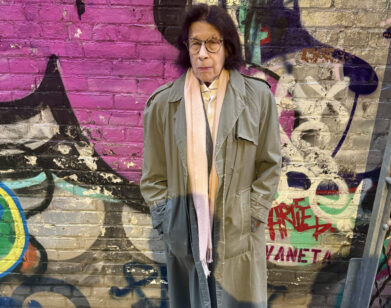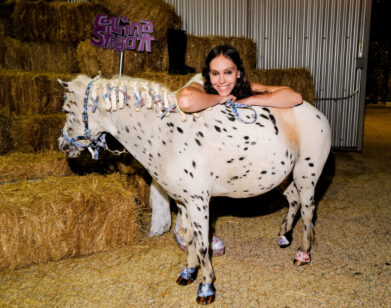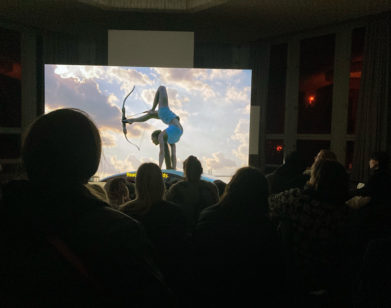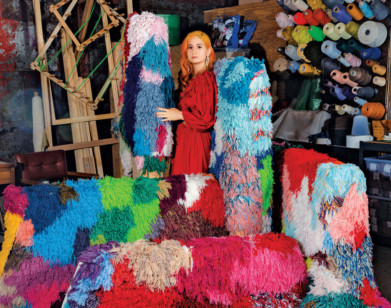EXPAT
How Richard Kennedy Made an Operetta for the Outcasts
The multi-disciplinary artist Richard Kennedy has lived in Berlin for a while now, but New York always welcomes back its most gifted expats. Kennedy, in particular, has returned to the city with a bang, beginning last week with their three-act tragicomedy operetta, Hybrid Peasant, at Performance Space New York, and continuing through April with an artist residency at the Ace Hotel. “I always wanted to go to the ballet, to the symphony, to see the Broadway shows, go to BAM, and really be that bitch,” Kennedy told their longtime friend Dosha, the multi-hyphenate artist and performer, on Zoom last week. “But it was giving McChickens and dollar slice.” That’s not the case anymore. Hybrid Peasant shows Kennedy at their most imaginative and disruptive, yanking an often traditionalist medium headlong into the present by crafting a time-bending “Nigthmerican dreamscape” based partly on the artist’s hometown of Middletown, Ohio. “I was just lit in high school, doing my thing, but always really participating because I needed to get out of there,” said the former class president. Just before their three-show run commenced, Kennedy and Dosha waxed poetic about the good old days of gallery-hopping for free wine and talked about making it in New York.
———
DOSHA: I feel like we haven’t had a conversation on the phone in a long time.
RICHARD KENNEDY: Which I miss! I’m going to be here for a month working on Hybrid Peasant and doing this residency at the Ace Hotel, so I’m excited to see you. Come to the show.
DOSHA: Well, I’m coming to the show on Saturday, 100%.
KENNEDY: Oh.
DOSHA: I’m going to look stunning.
KENNEDY: I bet you will.
DOSHA: Well, first of all, I am so sorry to hear about Shirley May. I wanted to talk to you about it in person. My heart, my love to you and your family.
KENNEDY: Thank you so much. My grandmama was amazing. She was so funny. She had a good life. She was exactly 50 years and four days older than me, so I feel like we were so similar, but so different. I just found this recording of her talking about how I had taken her to some pay-by-the-minute hotel. And I was like, “Girl, you got the wrong person.”
DOSHA: Who was she thinking?
KENNEDY: Girl, she was wild. My family is bootleggers on one side and on the other, my mom’s family, was domestics. You know what I mean? So I have these really different energies. She’s from North Carolina, then moved to Oakland in 1951 with her husband. She was married to some man in the Negro Leagues. She’s funny. This work is really this culmination of this chapter of my life, the 38 years where I had my grandma. But it’s making me understand family so much more and how we connect through this New York nightlife queer community. I am so sad, but I’m so happy that she’s free.
DOSHA: For sure. I don’t have a very close relationship with my birth family or my adoptive family. My New York City family is everything that sustains me. What’s your family looking like in Berlin?
KENNEDY: Berlin offers a lot of things, but I think I fell into a nightlife moment there that’s so totally different than it is here. New York is a monster. Berlin is like, a black hole.
DOSHA: It just sucks you in. It’s giving a hole.
KENNEDY: I’m not going to live there much longer. I’m not that girl. I’m going to be 40 in two years.
DOSHA: Ooh, same. Don’t tell nobody.
KENNEDY: We telling the world, whatever.
DOSHA: I know.
KENNEDY: You’re my favorite person in New York. And you have changed my life, and saved my life, and inspired my life.
DOSHA: Oh, gosh.
KENNEDY: You have made me accountable for my life so many times that I really scream your name from the mountaintops everywhere I go.
DOSHA: You’re a very polarizing person. But I always tell people, “No matter what anybody says about Richard, that’s my bitch. Richard picked me up so much. He put a little money in my pocket, gave me a platform to perform on, and has always showed me nothing but genuine love since the day we met.”
KENNEDY: I like to talk about the things nobody wants to talk about.
DOSHA: I know that there’s been a lot going on online. Is that going to come up in the Hybrid Peasant moment?
KENNEDY: Definitely. I grew up doing ballet and opera and always having to posture, constantly being told that I was fat, or that I was too late, or that everybody in the world was so much better than me. I just needed to break that character and be like, “You know what? Actually, I’m kooky and nuts and I don’t care. The world is nuts.” So I am using that in the work. I’m asking, “How do we expect the future to learn how to swim if you pour dirt into the public pools?” In my town, they filled the pool in. It’s like, “Okay, well how do the kids in the projects actually ever learn how to swim?” They ain’t going to the beach, they’re not going to the water.
DOSHA: Oh, the denial of access and elevation.
KENNEDY: Exactly.
DOSHA: I remember one of the first times I met you. I’d seen you out, running around crazy. You were dancing for Ssion for so long. And I was like, “Oh, you’re like an actual dancer.” And then you sang and I was like, “Oh, you can sing.” And then I was like, “Oh, this bitch is legit super-talented.” Sometimes, New York just puts you into this tiny, little box of just being a crazy nightlife figure.
KENNEDY: Thank you for seeing me. I got injured in Wicked and all the Black boys get the same exact injury. I really was processing it and had just had shoulder surgery. Then I only had one arm, so I started taking nightlife photos. I always wanted to go to the ballet, to the symphony, to see the Broadway shows, go to BAM, and really be that bitch. But it was giving McChickens and dollar slice.
DOSHA: It was giving chitlins.
KENNEDY: It was giving pickle juice, bitch. It was bad.
DOSHA: I feel like we made it work.
KENNEDY: We definitely did. We ate the world. Moving to Berlin was not my idea. I never, ever in a million years would move myself there. Now that I think my time is up there, I’m ready to come back to New York and be an uncle and a friend and an elder in the community. How do you feel about our roles changing as we get older?
DOSHA: You know, I’m actually doing a dry January right now.
KENNEDY: Okay!
DOSHA: I’m trying to really understand who I am, what I want, who am I with and without this persona, and what am I going to do moving forward. It’s giving midlife, which is very scary, but I don’t want to be in a fog or a haze or be numb about it. I want to really be present. I have a job, I take care of myself, my bills are paid. I feel like there’s so many distractions in New York.
KENNEDY: You do it at your own pace, and that’s what I respect and love the most. New York is an energy vortex where you don’t even know what’s sucking your energy. People being on the train, picking up on people’s vibes, it’s a lot. I have seen and experienced firsthand the power of isolation. I grew up popular. I was class president, but it was fucking weird. I just was like, “I beat up the town bully in the fifth grade.”
DOSHA: You were the class president?
KENNEDY: I was class president from sixth grade until 11th grade, until I got expelled.
DOSHA: You got expelled senior year?
KENNEDY: Girl, I got expelled in third grade, too. I got expelled senior year because I started going to the gay club when I was 16. So I was telling my mom that I had no school the next day. And then I would be up at 1470s or at Vertigo on a Tuesday night. They had this new wave industrial goth party on the college campus 45 minutes away from my house. And I’d be up in there, girl.
DOSHA: You’ve got to go to the new wave industrial goth party, bitch! If you’re not there, then where are you at?
KENNEDY: Where you at? I was just lit in high school, doing my thing, but always really participating because I needed to get out of there. I was a field commander of my marching band, girl. I choreographed my show choir. I was the prom committee chair. I just needed to go to college out of state for free.
DOSHA: Wait, where did you go to college again?
KENNEDY: I went to undergrad at this place in Pittsburgh called Point Park for dance. I went there for a year, dropped out, was in Fosse, went back because I had a boyfriend, dropped out again because I thought I was going to book High School Musical.
DOSHA: The movie?
KENNEDY: No, the stage show.
DOSHA: Were you going to be Corbin Bleu or Zac Efron?
KENNEDY: No, I was going to be in the ensemble, but probably covering him. I’m not an actress, and I definitely am not acting nobody straight.
DOSHA: Yeah.
KENNEDY: I’m like, “Hey, girl.” You know? “Hold my basketball.”
DOSHA: Exactly.
KENNEDY: I thought I was going to get that. Then I came to New York and went out the night before. I didn’t shave before the audition. It was just a chop.
DOSHA: That is such a New York City moment.
KENNEDY: Reeking of vodka.
DOSHA: They’re like, “Give it up, delicious.”
KENNEDY: Looking crazy. But that’s youth and I appreciate it now. And I appreciate the new year. Of course, this new show is opening on 1/11, which is the new moon and close to 11:11. Shout out Lady Fag.
DOSHA: Angel numbers. She kept money in my pocket. She kept me booked and busy.
KENNEDY: Exactly, same. Shout out Frankie Sharp. You know what I mean?
DOSHA: That’s my little boo. Speaking of, you’re not afraid to collaborate with a lot of other artists. Seeing the show that y’all did at Performance Space for the gala was so stunning. It made me so happy to see people that I love so much in that room wearing Miss Claire Sullivan designs. It was so fab. I know all these people from nightlife, but I know them as real people, too, so it was nice to see them get their flowers. That was a real New York moment for me.
KENNEDY: Yeah. I love it. The Performance Space New York staff has been incredible. Shout out Pati Hertling.
DOSHA: I love Pati.
KENNEDY: Pati saved my life the last year. I’m alive. We cannot talk about borders and boundaries in class in the larger scale of things if we do not dissolve those borders and boundaries within an artistic space, so that gala for me was the molding of my worlds.
DOSHA: Yeah.
KENNEDY: And that’s really what I do the best. I’m giving song and dance.
DOSHA: I was telling people, “Oh, she went to Europe and came back as Josephine Baker.”
KENNEDY: I felt like that was my night to really be like, “Okay, New York, this is really what I’m giving.” What I try to do is create queer jobs. I’m sick of queer icons dying. What I’m really trying to do is just introduce these people. I was just a tap dancing little Negro boy waiter all the time. I’m never going to do that again.
DOSHA: I need to be better about being open to collaboration with other artists, because so many people would love to do that. I’m such a control freak and such a fucking weirdo, I just pick everything apart. But I performed a remix of Juliana [Huxtable’s] new song “Pretty Canary” at her show and I was so nervous, Richard, because it wasn’t my show. Do you know what I mean? It’s Ju-Ju’s show. It’s her band.
KENNEDY: You’re in her band, bitch? That’s incredible.
DOSHA: I know. But I was so happy and so proud of the moment she was having that I didn’t want to come in and fuck it up. But we’re going to actually collaborate in the studio, make it a full thing. I’m isolating myself right now during my dry January so that I can really figure it out. I bought a sketchpad and some colored pencils on Amazon, bitch.
KENNEDY: Me too. I’m trying to have a sober life. My grandmother, that’s the only thing she asked of me.
DOSHA: 100% sober?
KENNEDY: Yeah, because the weed is stupid now. It just steals my energy and I’m not getting anything done. Being a hyper-creative person, you know how it goes. Things just come through and flood. Sometimes, I’m hearing beautiful birds and flutes. And then other times you’re like, “Oh, this music is psycho killer.” I’m hearing symphonies in my head. And I’ve been getting into a lot of these ancestral practices. I went to Bahia and took this Afro-Brazilian workshop with this woman, Vera Passos, who changed my life in five minutes. I was weeping. We bowed to the earth, we gave honor to the sky, we gave honor to the arts, our hearts. I was like, “In my 25 years of dance, I’ve never had a teacher acknowledge anything but themselves.”
DOSHA: Oh, I’m obsessed with that.
KENNEDY: She’s lit, lit, lit. She’s the spirit of the ancestors. This higher force and power has made its presence very known, when I’m sober. I was sober during the gala, I was sober for four months and meditating nine hours a day.
DOSHA: Wow.
KENNEDY: I was brainwashed my whole life and I think that’s what I’ve been working through. My dad said, “Second place is the first loser.” My dance professor in college, “You ain’t shit. If I was you, I would go to your studio with a gun and kill everybody or ask for your money back.” These are direct quotes. I want to see a mainstream star from the New York Underground. I feel like it was supposed to be me and you.
DOSHA: Well, you know what? I always tell people that I’m an international girl.
KENNEDY: Yeah.
DOSHA: You’ve always lifted me up. That’s what’s really important to me, real, honest, authentic, truthful, genuine friendships and relationships.
KENNEDY: You have given me that. You are one of few people who make me feel I don’t have to shrink myself. I want to re-meet a lot of people, because I feel it’s just that it’s time. When we were younger, culture wasn’t what it was today.
DOSHA: Every generation gets something different from the last. New York City will always be the littest city in the world. DJs, music, art, everything. I think people will always be drawn to New York City for that. I don’t think it’s ever changed, ever.
KENNEDY: I used to be at the art openings for the free wine.
DOSHA: I miss gallery crawling, though. That was when I didn’t have any money to buy alcohol. I’d just show up to every gallery show on a Thursday night, like, “Ooh, yes, love it. Where the wine at?” We used to just get up in their fucking alcohol, period. But I also met a lot of artists that way, a lot of people that I’m still friends with, just going to galleries and trying to get lit.
KENNEDY: I love the internet and the connectivity of it. But I do love the idea that you had to stumble upon things.
DOSHA: Even with dating now, people are like, “You’ve got to get online.” I’m like, “Call me old-fashioned, but I want to get drunk in a bar and see somebody from across the room and make out, then figure it out from there.”
KENNEDY: Same, same, same. But I ain’t worried about no man. I’m falling in love with myself and falling in love with my work and falling in love with my friends and my family. That’s what I’m devoting my life to until I meet a man who ain’t going to be playing no games. Because it’s like, the Berlin gay man scene–
DOSHA: I know, they will literally gamble with your bones for fun.
KENNEDY: Honey, I want to be with a tender love. I don’t want to go home and feel like my boyfriend is emotionally and mentally body-slamming me. I mean, body-slamming in the sheets, but no body-slamming in the streets.
DOSHA: I felt that.
KENNEDY: But I am so happy to be here and I’m so excited you’re coming to the show. I hope people come and have fun and have a laugh, because it is a tragic comedy.
DOSHA: I can’t wait for the operetta.
KENNEDY: It’s going to be fun.
DOSHA: Period. I love you.
KENNEDY: Let’s have a sober night out, girl. I’m down.

